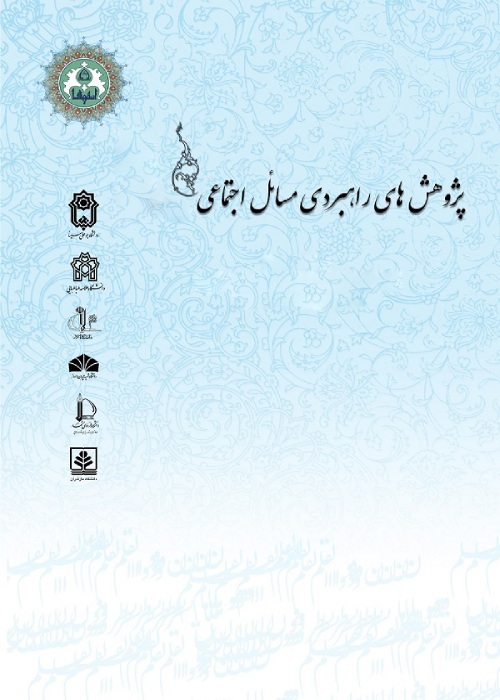The Concept and Sociological Analysis of the Conditions of Social Malingering
Malingering means pretending to be sick to escape responsibility, a widespread matter that can be generally seen in medicines, prisons, barracks, and some public and private offices/organizations (Rahbar Taramsari et al., 2018: 46). However, malingering is not only about health, social ethics, or personal issues, as many experts stipulated that malingering stems from some major cultural and psychological problems in any society (Davoodi, 2016). Most psychiatric and psychological research on malingering seeks to diagnose and treat it from a psychological point of view. This study aims to deal with this problem by adopting a sociological approach. The central question of this research is: why and how does the avoidance of performing legal and moral duties regarding external and unjustified factors appear in social interactions and/or daily life? This concept, which has been considered at the beginning of the research with the conceptual tool of social malingering, needs to be clarified. Since this concept has recently been to some extent worked out by the authors of this study and because its conceptual framework might not be clear for some readers, we seek to explore how social scientists, whose thoughts and individual experiences are referred to in this study, would understand and perceive the phenomenon of social malingering. Therefore, the main purpose of the present study was the semantic inference and conceptualization of the phenomenon of social malingering and the sociological analysis of the contexts leading to malingering formation in social interactions and everyday life. In this study, social malingering has a broader meaning that is received in the integrity and completeness of the research.
In this study, by referring to the thoughts and individual experiences of social scientists, and with the grounded theory approach, the authors sought to understand social malingering in social interactions and everyday life. To this end, with a qualitative approach and conducting problem-centered interviews, we adopted grounded theory to explain social malingering in our society. This path is based on the systematic GTM scheme (SY-GTM), the systematic model of Strauss and Corbin, in the systematic approach to the grounded theory method. In this way, by the theoretical sampling method, 15 experts and social scientists were selected for in-depth interviews. The data obtained from interviews with research participants were analyzed and categorized using the three-step coding process in the systematic GTM scheme. According to social scientists such as Stern (1981) and Strauss and Corbin (1990), qualitative methods especially grounded theory, aim to discover unknown areas of life. In the present study, in line with the same purpose, by exploring the topics related to social malingering in various documents and opinions, the authors focused on what, how, and why social malingering acts from the perspective of experts and social scientists, especially sociologists. The logic for choosing Strauss and Corbin’s paradigm model or the systematic GTM scheme in the underlying grounded theory strategy in this study was the participants who took part in the study. Some issues like a conversation with social scientists and experts, having common literature that was constantly associated with sociological concepts and terms, and being unconscious in the beginning and the middle of research consciously strengthened the concern for accuracy, scientific methods, and structure of the study. Naturally, the reference to the thoughts and individual experiences of social scientists reinforced the systematic and precise scientific procedures that Strauss and Corbin emphasized in the systematic GTM scheme. In the present study, the authors have also used the MAXQDA software to achieve a theoretical model that explicates and explains social malingering in social interactions and everyday life. One of the features of this software is its inherent capability for drawing the model. Last but not least, it can be very useful to explain the grounded theory of the research.
This study identified protest as a core and pivotal issue. Protests against cultural and social conditions and the lack of ontological security, along with causal conditions, contextual conditions, and mediator conditions, all have led to the application of social malingering strategy by members of the society. In other words, in any society in which there is a lack of ontological security, bad governance, ideological morality, individuality cult, weakening of social morality, and the anomaly of individuals and reference groups, members would protest and do social malingering. The result of such a life-world is a decline and weakness in social capital and the unpredictability of social behavior. According to the findings of the present study, social malingering includes specific actions and interactions that are associated with irresponsibility, rationalization, and pretension. This social action manifests itself in various ways in everyday interactions and should not be simplified to just one aspect. Also, social malingering is understandable in the plotting of its causal, contextual, and mediator conditions, and in the network among those conditions
- حق عضویت دریافتی صرف حمایت از نشریات عضو و نگهداری، تکمیل و توسعه مگیران میشود.
- پرداخت حق اشتراک و دانلود مقالات اجازه بازنشر آن در سایر رسانههای چاپی و دیجیتال را به کاربر نمیدهد.





